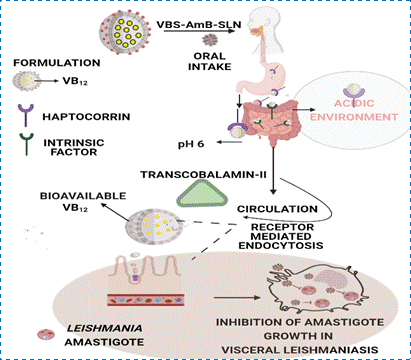DELHI : 16 AUG 2021
Indian researchers have developed a non-invasive, easy to administer, cost-effective, and patient compliant potential therapeutic strategy against Visceral Leishmaniasis, a neglected tropical disease. Their strategy based on nano carrier-based oral drugs coated with Vitamin B12 enhanced oral bioavailability and efficacy of the therapy by more than 90%.
Visceral Leishmaniasis (VL) is a complex infectious disease transmitted by the bite of female Phlebotomine sandflies. It is a neglected tropical disease that affects millions annually, making it the second most common parasitic killer after malaria. The conventional treatment therapy of VL mainly involves painful intravenous administration, which imposes many treatment complications, including prolonged hospitalization, high cost, and high risk of infection. Oral drug delivery brings forth massive advantages that can help overcome these barriers. But with oral routes, there are other challenges as more than 90% of orally administered therapeutic drugs have less than 2% bioavailability and potentially high hepatic and renal toxic side effects.
A team led by Dr. Shyam Lal from the Institute of Nano Science and Technology (INST), an autonomous institute of the Department of Science and Technology (DST), GoI has developed a smart and intelligent nanocarrier utilizing the natural intrinsic Vitamin B12 pathway present in human body that can mitigate stability challenges and drug-associated toxicity. They have disguised the toxic but highly efficient drug of the disease within a biocompatible lipid nanocarrier shielding it from degradation in the hostile gastric environment, thus overcoming the gastrointestinal enzymatic barriers endured by any foreign synthetic drug molecule. This minimized its side effects, while the natural intrinsic Vitamin B12 pathway enhanced the oral bioavailability and antileishmanial therapeutic efficacy by more than 90%, as shown in the associated animal studies. The research was supported under the DST-SERB Early Career Research Award and published in Materials Science & Engineering C’.
The INST team critically evaluated the efficacy and properties of Vitamin B12 (VB12) coated solid lipid nanoparticles and their subsequent potential ramification in evading cytotoxicity and escalating stability.
They conceptualized an innate immune defence mechanism to enhance the physicochemical properties of orally administered nanoparticles, which can easily navigate through the gastrointestinal tract without being washed away by naturally present mucus barrier.
Anchoring Vitamin B12 on the surface of solid lipid nanoparticles augmented the stability and targeted delivery of the poorly soluble drugs and also enhanced the therapeutic efficiency with reduced risks of off-target actions. The research showed that Vitamin B12 being an essential lifesaving micronutrient, which plays a pivotal role in the body by modulating the toxic side effects associated with the most neglected tropical disease, also works as an innovative and beneficial supplement for its treatment and prevention. It not only reduces the risk of infection but also enhances the immunity of an individual. Moreover, it also improves the bioavailability and targeted delivery by utilizing the natural intrinsic Vitamin B12 pathway, which is present in the human body and hence developing resistance for infection spread.


 हिंदी
हिंदी






